Neil deGrasse Tyson and Ann Druyan Talk ‘Cosmos: Possible Worlds’ @NatGeo @COSMOSonTV
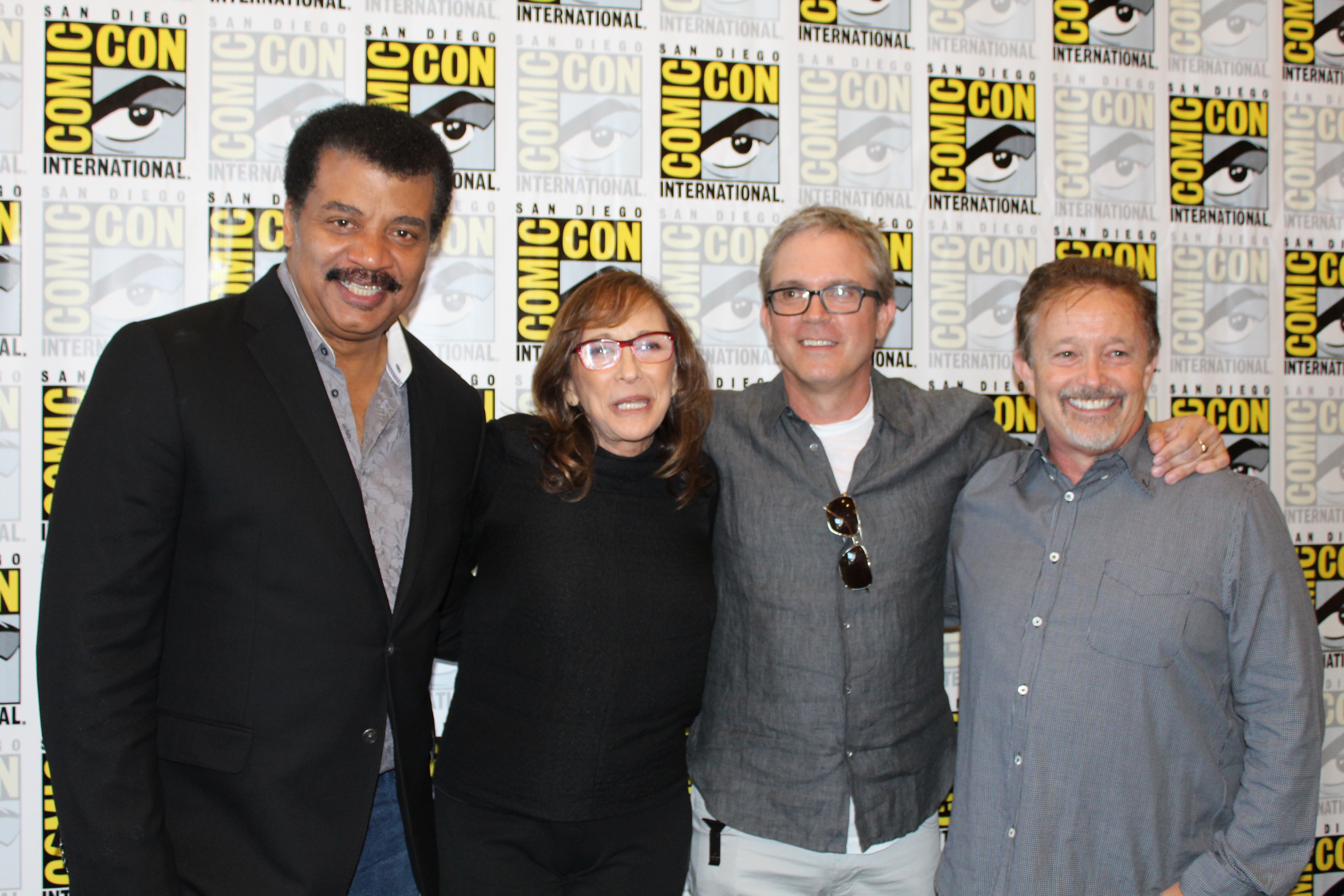 San Diego Comic Con is famous for science fiction, but this year they showcased science fact with a huge National Geographic presence in support of Cosmos: Possible Worlds. The follow-up to 2014’s award-winning Cosmos: A Spacetime Odyssey is due out next March, but NatGeo gave fans a sneak peek with an immersive space travel experience and a panel in the Indigo. Plus, we got to got to sit down with the cast!
San Diego Comic Con is famous for science fiction, but this year they showcased science fact with a huge National Geographic presence in support of Cosmos: Possible Worlds. The follow-up to 2014’s award-winning Cosmos: A Spacetime Odyssey is due out next March, but NatGeo gave fans a sneak peek with an immersive space travel experience and a panel in the Indigo. Plus, we got to got to sit down with the cast!
Read on to hear from the incredible Neil deGrasse Tyson, Creator and Director Ann Druyan, and Executive Producers Brannon Braga and Jason Clark about science, making TV, and what we can expect from Cosmos: Possible Worlds.
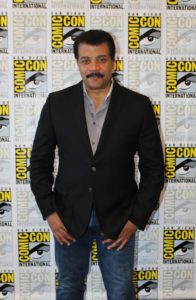
Astrophysicist Neil deGrasse Tyson is the kind of scientist who inspires memes and viral Twitter threads (though he makes a point not to be specifically political on social media). He hosted Cosmos: A Spacetime Odyssey and is doing the same for the upcoming Possible Worlds, too.
What excites him about Cosmos: Possible Worlds
“This entire set of episodes explores what power we have over our own fate. Possible Worlds is an exploration of how our knowledge of how the universe works can influence what kind of world we create for ourselves going forward. We have evidence! There are worlds that have runaway Greenhouse Effects so there are no life. There are worlds where they’ve collided with other worlds, so if there was life there’s not life there now. There are places where planets have been consumed by their host star because the star was dying. This knowledge brought back to our solar solar system, our planet, can be simultaneously enlightening and frightening, and the solutions don’t come from hoping. They don’t come from praying. They come from understanding how and why science works, and taking that to task on the problems that come before us. What I’m most excited to present is an empowerment of the control we will have over civilization.”
On science deniers
“We can deny science, and as we do we fade as a nation on the world stage… When Europe and Asia and Africa have a conference on the future of the species and we’re not even at the table because they’re having a conversation about climate change and our contingent denies it- we’re not at the table, so we will fade to irrelevance as shapers of the future of civilization.”
His reputation for criticizing politicians on Twitter
“I haven’t actually! People think that, but I haven’t. You cannot cite a single Tweet. What happens is that people come to my Tweet with their own political leanings and interpret it according to that lens. But my Tweets are fundamentally politically neutral. For example, a few days ago I Tweeted, “Let’s make America smart again.” Someone said, “You gotta keep politics out of this!” Well, show me what’s political about that sentence. Of course it’s a take on Make American Great Again, but do you want to debate that sentence? Where is your angle against that sentence? There isn’t one, it’s simply a sentence. But people want to politicize things. The word Trump has never appeared in any of my Tweets- ever!”
Balancing politics and science
“You want political diversity, that’s great. The pluralistic dimension of society is actually its strength, otherwise you have a dictatorship. What you want is everyone to agree on what scientific discoveries tell you, then you go into the back room and debate what policies you would rather have in response to those facts. That’s what should be happening in Congress, but it’s not. People are debating whether something that’s scientifically demonstrated to be true is actually true, and that’s the beginning of the end of an informed Congress.”
The role of science in fiction
“You don’t have to teach science. What you want to do is inspire science. This is different. Don’t worry about a syllabus. Worry about, at the end of the day, is someone saying, “Wow, that’s cool! I want to learn more about time travel or this phenomenon or this effect. They mentioned DNA, what is DNA? I want to find out.” It’s the stimulation of curiosity that for me matters much more than what syllabus you’re expected to deliver in a creative work that you post.”
Religious criticism of Cosmos
“It’s not our goal to rid you of your religion. It’s our goal to offer you our understanding of how and why the universe works. If that conflicts with your religion you might see that as a problem. You might blend it with your religion. There are plenty of religions today- Catholicism included- that are enlightened in their scientific postures… People have their reconciliations with their belief systems. [Cosmos] is not a trap to rid you of your religion, that’s not the goal. The goal is to offer the universe as it is, as science has revealed it to us.”
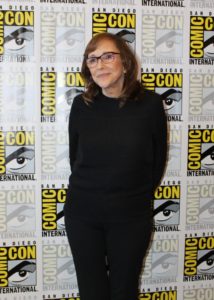
Ann Druyan is all kinds of awesome. She wears a lot of hats on Cosmos: Creator, Director, Writer, and Executive Producer. Fun note: she also co-wrote the original 1980s Cosmos: A Personal Voyage with Carl Sagan, who she later married.
Keeping Cosmos fresh
“The show is called Possible Worlds and this is only our third season. There’s more than enough universe to show, so many untold stories in the history of science and so many heroes that haven’t been given their due. We get to do that.”
On Carl Sagan’s legacy
“When we started out in 1978, Carl and I had very big dreams for this series, but in reality the total embrace of Cosmos– both seasons- has been beyond any expectations. I feel like more people love Carl now than did when he was alive. He’s been gone 22 years and yet people are still tattooing his likeness on his body!”
About politicized rejection of science
“At the heart of Cosmos is this idea that it matters what’s true. You can’t BS your way- every single step in the journey has to be true…. We won’t get anywhere in the cosmos if we don’t begin taking science to heart.”
Getting scientists to share brand-new research on Cosmos
“As Carl used to say, when you’re in love you want to tell the world. The value of science is the free, open exchange of ideas. I’ve found that scientists have a kind of humility in wanting to share ideas and being open to hearing contrary opinions. More than any walk of life, actually.”
Her favorite upcoming Cosmos episode
“I’m particularly excited about one episode of the new season called “Magic Without Lies”. It’s about quantum mechanics, quantum physics. I’m not a scientist, and I think part of the success of the series is that I know if I don’t understand it, it’s no good. I’m like everyone, and I want everyone to understand it. This [episode] is about a realm of science that nobody understands… It’s as if we found that little hole in the curtain that hides the Matrix. The things that scientists love the most and what I love the most are the things that we don’t understand. And there’s no shame in it! To me it’s such a liberation.”
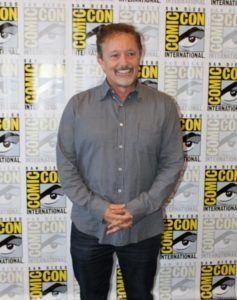 Jason Clark, Executive Producer for Cosmos, is best known to geeks either for The Orville or for his work as Executive Producer on The Cabin In The Woods. He just finished another miniseries for NatGeo called The Long Road Home.
Jason Clark, Executive Producer for Cosmos, is best known to geeks either for The Orville or for his work as Executive Producer on The Cabin In The Woods. He just finished another miniseries for NatGeo called The Long Road Home.
On making Cosmos
“It’s the greatest story that all of us could ever want to know. It’s the story of us! Who we are, where we come from, and where we could possibly go.”
The real-world impact of the show
“The single greatest opportunity is that you can take one mind and turn it on, and they could go from there to anywhere. We were signing autographs this morning. A guy came up, pointed to Neil, and said, “He changed my life. Because of him I became a scientist, and that was because of Cosmos.” We got one!”
The power of television and the possibility of online-only content
“135 million people saw the last season within the first month of airing. 135 million is a pretty big reach, and that’s the power of television. National Geographic has incredible reach and Fox has an incredible reach domestically. With our two distributors are focused on delivering that experience as best we can and then diving into all these other things [online content]…. Those kind of opportunities we see as the next step.”
What making Cosmos is like
“This is a complex production. It took 2 years to prepare, we’ll be shooting for an entire year. We have two teams who’ve shot on every continent- almost every continent- in the world. We’ll have multiple animation teams and visual effects companies from around the world [working on] the 13 scripts that Ann and Brannan wrote.”
Working with Fox and National Geographic
“[Fox and NatGeo] have been the most supportive partners, and I’m excited by what they’ve done. Here at Comic Con they have a dome experience, a 33-foot dome… and it is a WOW experience. I got a little off kilter looking up at this- it projects a vision on the dome of a trip to an exoplanet.” [Editor’s note: I went through the dome and it was just as incredible as promised- almost a VR experience!]
On Seth McFarlane’s role as executive producer
“Cosmos is an unusual science documentary and it requires unusual support, and [Seth McFarlane] has been that support.”
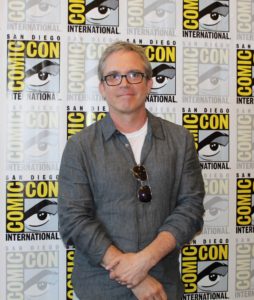 Brannan Braga is an Emmy-nominated writer and producer who’s worked on shows like Terra Nova, 24, and spent 15 years doing Star Trek franchises. He also writes for The Orville with Executive Producer Seth McFarlane (who made the panel but not the interviews).
Brannan Braga is an Emmy-nominated writer and producer who’s worked on shows like Terra Nova, 24, and spent 15 years doing Star Trek franchises. He also writes for The Orville with Executive Producer Seth McFarlane (who made the panel but not the interviews).
How his work on genre shows like Star Trek and The Orville compares to Cosmos
“The shows are cousins in that they’re both about a hopeful human future. They’re both about the things that humans are capable of. They’re optimistic shows, they both have spaceships, they’re about exploration. It’s just that in one, you can’t make [stuff] up. I can imagine anything I want on Star Trek or The Orville but on Cosmos you have to be factual. Scripts take a lot longer to write. But I kind of feel like my 15 years on Star Trek prepared me for Cosmos. I don’t think if I hadn’t done that I would know what I was doing.”
Realizing sci-fi tropes he used on TV weren’t too far from reality
“We have an episode this season dealing with quantum physics. There were several ideas in that that I said, “Oh, I did that in Star Trek. This is real!” Parallel universes, different branching realities, that’s all rooted in quantum physics and I didn’t realize it was an actual theory. I was wrong about more than I was right about, though.”
Why so many young people are Cosmos fans
“I can only assume it’s because the subject matter is interesting. Children and teenagers were a huge part of our audience last time and they just seem to eat it up. Anecdotally, I heard last time that families watch the show together. Our demographic is very wide.”
On Cosmos and spirituality
“The show’s about science. We’re careful not to criticize people’s belief systems, that’s the worst way to educate… Science is a spiritual endeavor, and that’s to me what makes the show great. It can move you to tears. There were moments last season that I got very emotional watching, and hopefully that’s going to happen this time, too. If you can reach people on that level you’re really reaching them.”
Note: These questions are pulled from some incredible roundtable interviews with the Cosmos crew. If you want to know more (you want to know more, right?) catch Cosmos: Possible Worlds next March on Fox and National Geographic!
Author: Khai
Khai is a writer, anthropologist, and games enthusiast. She is co-editor (alongside Alex DeCampi) of and contributor to “True War Stories”, a comic anthology published by Z2 Comics. When she’s not writing or creating games, Khai likes to run more tabletop RPGs than one person should reasonably juggle.
Help support independent journalism. Subscribe to our Patreon.
Copyright © The Geekiary
Do not copy our content in whole to other websites. If you are reading this anywhere besides TheGeekiary.com, it has been stolen.Read our

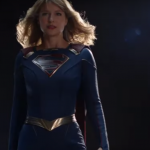
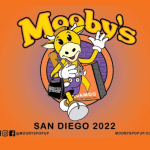

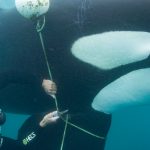

Tyson claims “The word Trump has never appeared in any of my Tweets- ever!”
Evidently Tyson has deleted his November 2016 Tweet:
“When I meet President Trump, I may first grab his crotch — to get his attention — then discuss Science with him”
Does he want us to believe he never made that tweet?
Ann Druyan: “At the heart of Cosmos is this idea that it matters what’s true.”
Then why are they using Tyson? Neil has zero regard for rigor and accuracy.
His mangling high school math and science is merely annoying. Who really cares if Joe Rogan believes him when Tyson tells him there are more transcendental numbers than irrationals?
But Tyson will also use his imaginative and sloppily researched story telling style to invent false history. And then use the bad history to support his political talking points.
Sorry, Ann. But a show that stars Neil deGrasse Tyson obviously has little regard for the truth.